
Macroeconomic
bulletin
Winter
2023-2024
J anuary
2024
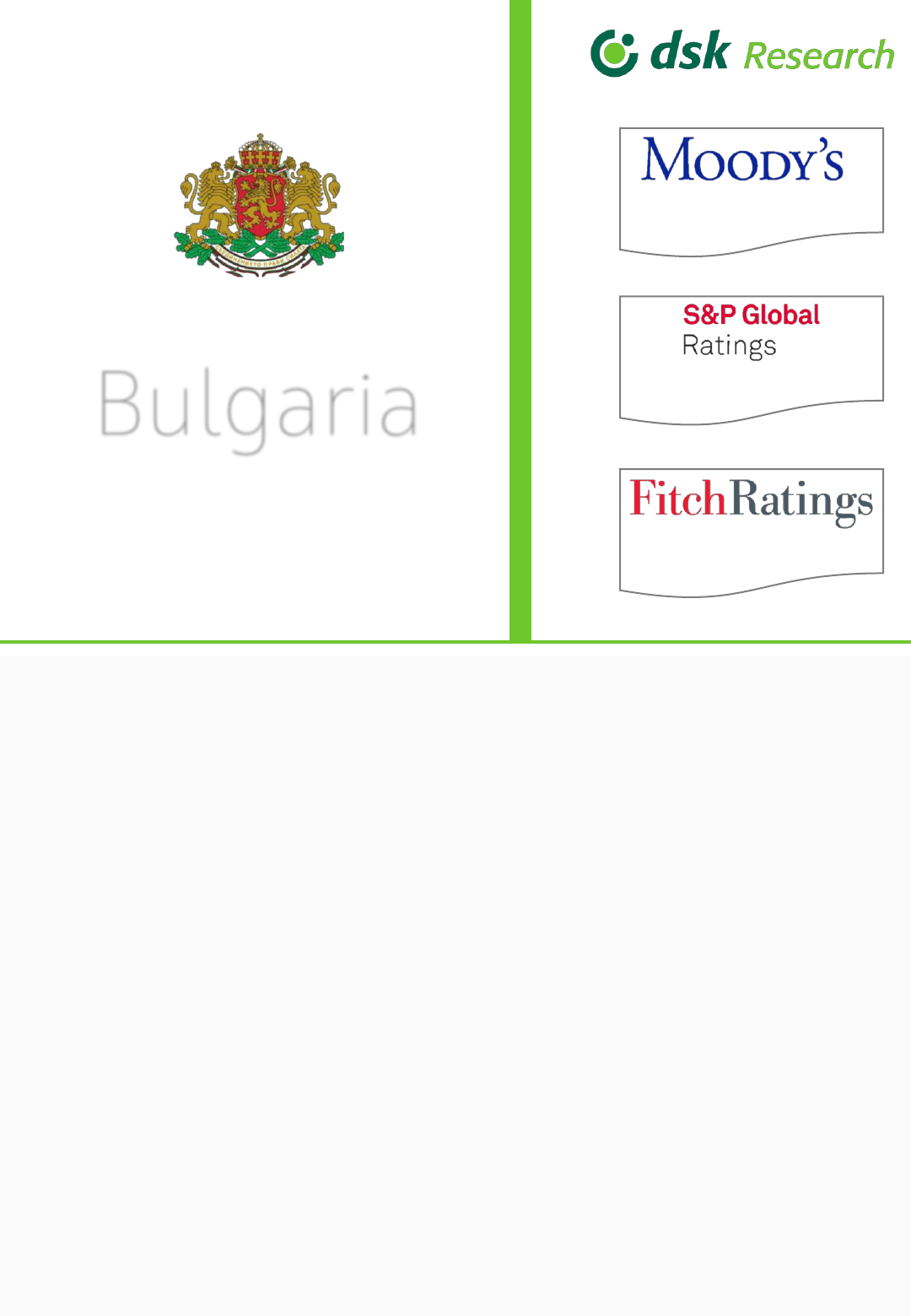
2
Bulgaria
Sovereign credit rating
Baa1 stable
BBB positive
BBB positive
❖ Almost two years have passed since the beginning of the Russian-Ukrainian war that was
expected to be over within a few months. Two years later, the fighting continues, support for
Ukraine brings with it political contradictions and division of the population. 2023 – the year of
uncertainly, increasing hostilities around the world, inflationary pressure and weak global
economic growth. Unfortunately, most of the factors from 2023 continue into 2024. Wars
continue (even with expectations to spread further), threats to international trade, inflation is
still far from central banks targets, and high interest rates slowing economic activity and global
economic growth. Oil prices remain steady despite OPEC+ attempts to influence the price
upwards but the increased US shale gas production counterbalancing this effect.
❖ The Bulgarian economy also slowed its growth in 2023 in line with the slowdown of the
European economy. Generally, the labour market continues to perform well with unemployment
rate remaining at low level, while wage growth continues to report significant increases as a
result of which private consumption will be supported by rising household disposable income.
Inflation has seriously reduced its pressure over the past year, reporting annual inflation of 5%,
expected to further decline to 2% at the end of 2024 (HICP, annual inflation).
❖ The Maastricht inflation criterion for the euro adoption seems unlikely to be met by Bulgaria by
the end of April 2024, which calls into question the Euro area entry date – January 1, 2025.
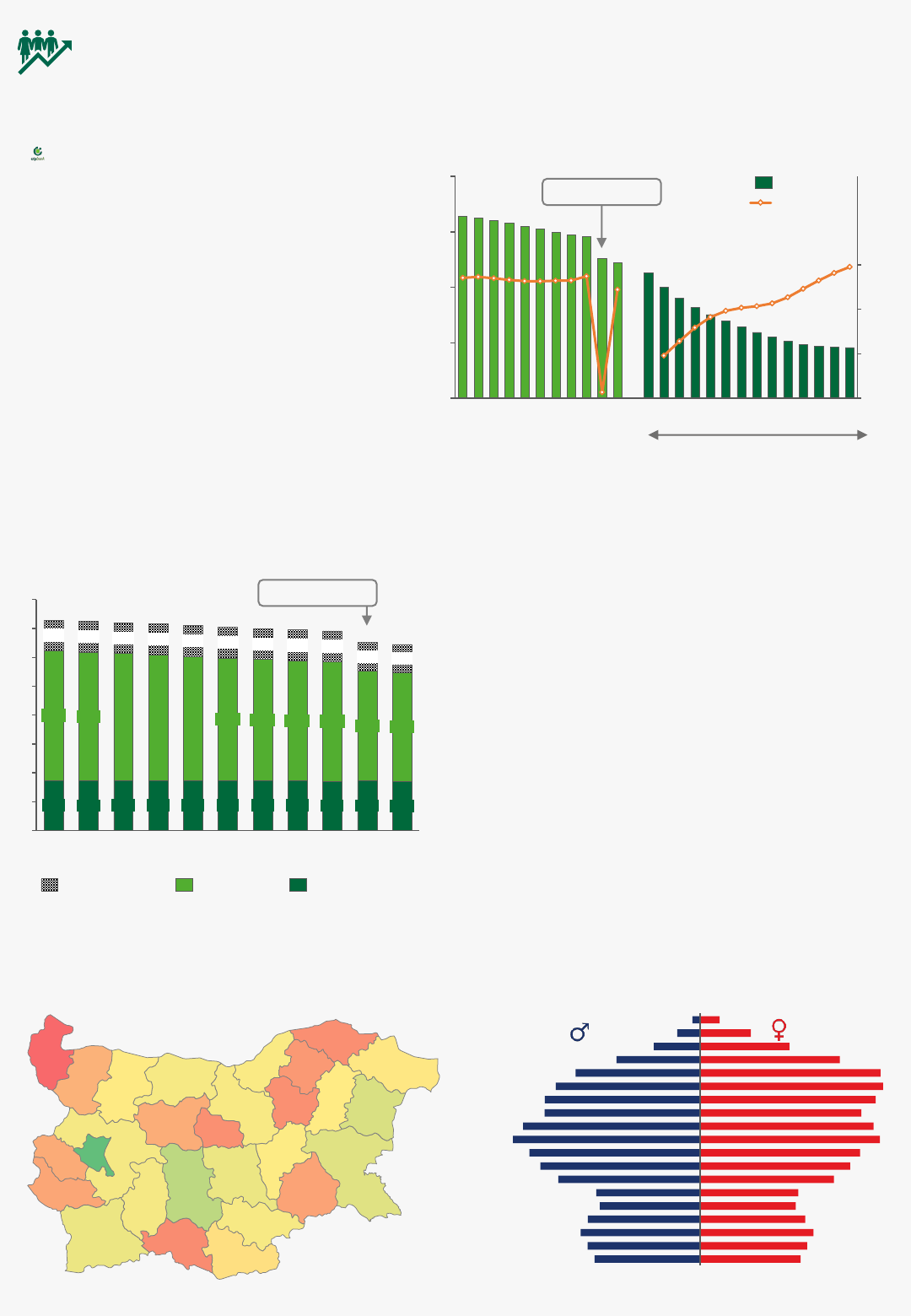
Population by working age status
Population by administrative regions
as of 31.12.2022
Demographics
3
5
6
7
8
4 -6%
-4%
-2%
0%
(mn)
2012
2013
2014
2015
2016
2017
2019
2020
2021
2022
2025
2030
2035
2040
2045
2050
2055
2060
2065
2070
2075
2080
2085
2090
2018
Population
Annual growth
0
1
2
3
4
5
6
7
8
(mn)
14%
62%
24%
2012
15%
62%
24%
2013
15%
61%
24%
2014
15%
61%
24%
2015
15%
61%
24%
2016
15%
60%
25%
2017
15%
60%
25%
2018
15%
60%
25%
2019
15%
60%
25%
2020
15%
59%
26%
2021
15%
59%
26%
2022
Under working age At working age Over working age
The published data on the Bulgarian
population as of the End-2022 confirms
the negative demographic trend, and
this would not change without taking
urgent long-term demographic and
social measures against it. The trend of
urbanization and concentration in Sofia
continues, as every fourth person lives in
Sofia-city (incl. the satellite settlements
around the capital). The forecast of Bulg..
Population of Bulgaria
population until 2080 after Census 2021 was also
revised, and the big picture looks even more
dramatic. The labour market will be thinning
more and more, it would be respectively more
difficult for companies to hire new employees, and
the only possibility to deal with that in the mid-
term is the development of digital government
management and the possible allocation of
human resources from state to private sector.
However, this requires a purposeful state policy
on digitization/automatization of the state
services offered by the administration.
The big picture looks even more dramatic after the revised forecast
90 +
85 - 89
80 - 84
75 - 79
70 - 74
65 - 69
60 - 64
55 - 59
50 - 54
45 - 49
40 - 44
35 - 39
30 - 34
25 - 29
20 - 24
15 - 19
10 - 14
5 - 9
0 - 4
Population pyramid:
The process of ageing continues
NSI Forecast
as of 31.12.2022
Census 2021
Census 2021
6%
2%
3%
1%
2%
4%
2%
2%
4%
1%
3%
2%
2%
3%
3%
2%
1%
7%
10%
5%
3%
2%
2%
1%
1%
4%
2%
20%
aria’s
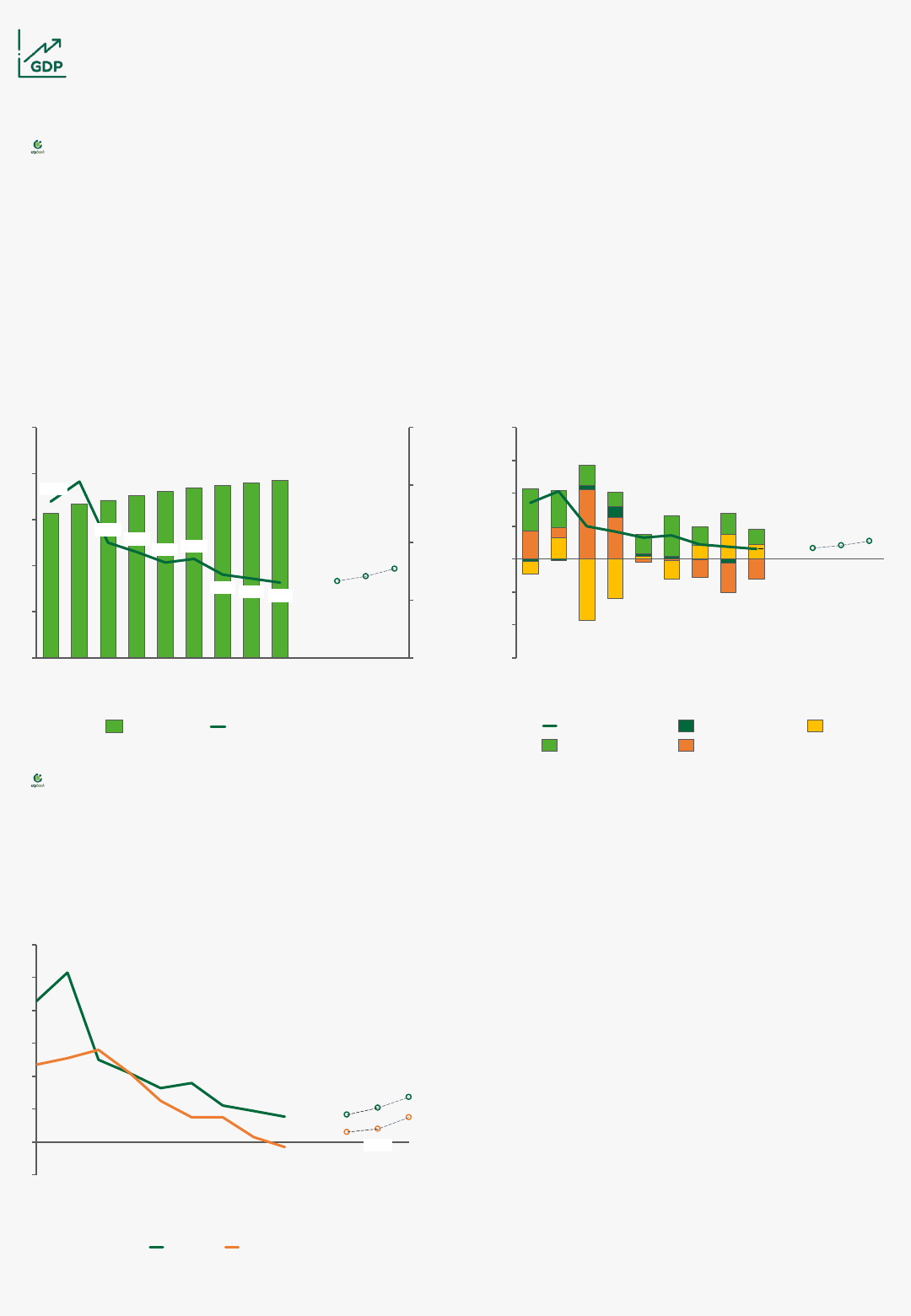
The revised GDP data affected investments mostly, altering their long-term potential. As a
result, we have also revised the forecast growth of investments in the mid-term, expecting a
strengthening of investments in both the public and private sectors, additionally supported by
Gross Domestic Product
4
1.5%
1.7%
2.1%
2.7%
-15%
-10%
-5%
0%
5%
10%
15%
20%
3Q 2021
4Q 2021
1Q 2022
2Q 2022
3Q 2022
4Q 2022
1Q 2023
2Q 2023
3Q 2023
2023
2024
2025
Annual growth (YoY)
Private comsumption
Public consumption
Investments
Net exports
The Bulgarian economy is successfully passing through the shallow recession in which the
European economy finds itself. Despite the mid-term slowdown in economic activity, we expect
the recovery to begin in early 2024. The recovery will be supported mostly by private
consumption and net exports, while investment and government spending are not yet to show
a sustained positive trend. Private consumption will continue to be the main driver of GDP
growth largely supported by low lending rates, low unemployment, increasing disposable
income and expansionary fiscal policy.
Bulgaria: GDP GDP by components
Waiting for the start of the recovery period in Europe and Bulgaria
GDP, Bulgaria vs. Euro area
-5%
0%
5%
10%
15%
20
22
24
26
28
30
BGN bn
8.6%
3Q 2021
10.3%
4Q 2021
5.0%
1Q 2022
4.2%
2Q 2022
3.3%
3Q 2022
3.6%
4Q 2022
2.2%
1Q 2023
1.9%
2Q 2023
1.5%
3Q 2023
1.7%
2023
2.1%
2024
2.7%
2025
1.5%
-0.3%
0.6%
1.5%
1.7%
2.1%
2.7%
-2%
0%
2%
4%
6%
8%
10%
12%
3Q 2021
4Q 2021
1Q 2022
2Q 2022
3Q 2022
4Q 2022
1Q 2023
2Q 2023
3Q 2023
2023
0.8%
2024
2025
Bulgaria Euro area
Annual growth (YoY), at average 2015 price
the Recovery and Resilience Facility. Net exports
have also seen a revision to the data as we expect
strong contribution to GDP growth in 2023 due to
a larger decline in import than export. 2023 is
characterized by a weak performance of net
exports, largely influenced by lower external
demand, unexpected negative events in the
Bulgarian industry and lower economic activity.
With the recovery of the European and Bulgarian
economy, expectations are for significantly more
favorable conditions for trade.
Annual growth (YoY),
at average 2015 price
Annual growth (YoY),
at average 2015 price
*Seasonally and calendar adjusted data
GDP*, volume Annual growth (YoY)
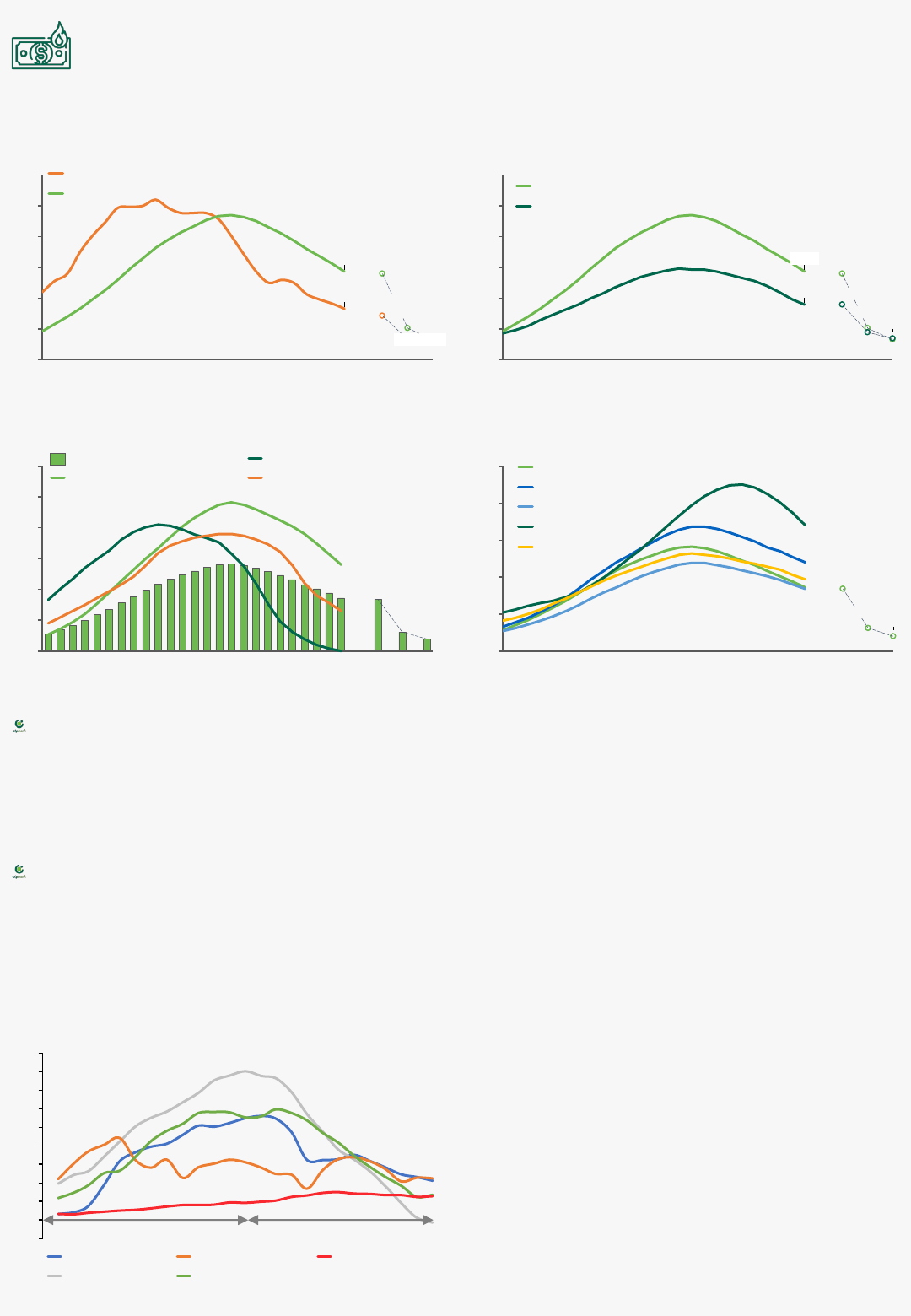
Annual average growth
Inflation
5
0%
5%
10%
15%
20%
25%
30%
12/21
02/22
04/22
06/22
08/22
10/22
12/22
02/23
04/23
06/23
08/23
10/23
12/23
2023
2024
2025
HICP
Food and non-alcoholic beverages
Transport
Housing, water, electricity, gas
Inflation uncertainty is fading day by day, as only geopolitical tensions in various problematic
regions of the world fuel fears returning to a full-blown inflationary crisis. International prices of
energy resources are showing composure in the face of military actions, with expectations for
healthy levels in the mid-term as well.
All countries (incl. Bulgaria) close to the Russian-Ukrainian war have a large negative effect on
prices. In Bulgaria, the pressure is higher compared to the Euro Area average level but compared
to the countries of Central and Eastern Europe, the inflation in Bulgaria performs relatively well.
Harmonized Indices of Consumer Prices
(HICP)
HICP by commodity group*
Surrounded by many uncertainties, inflation is gradually reducing its pressure
HICP, Bulgaria vs. CEE countries
5.0%
8.6%
8.4%
3.1%
2.0%
4.3%
0%
3%
6%
9%
12%
15%
18%
12/21
02/22
04/22
06/22
08/22
10/22
12/22
02/23
04/23
06/23
08/23
10/23
12/23
2023
2.0%
2024
2.0%
2025
Annual inflation YoY
Annual average inflation
-5%
5%
15%
25%
35%
45%
Basic basket inflation
Annual average growth
*Three consumer groups with the largest weights in the HICP general basket are presented
2022 2023
Annual inflation YoY
HICP, Bulgaria vs. Euro area
5.4%
8.4%
3.1%
2.0%
5.4%
2.7%
2.1%
0%
3%
6%
9%
12%
15%
18%
12/21
02/22
04/22
06/22
08/22
10/22
12/22
02/23
04/23
06/23
08/23
10/23
12/23
2023
2024
2025
8.6%
Bulgaria
Euro area
The disinflationary trend continues, confirmed by
the latest data as of December 2023. Inflation
(HICP) recorded an annual increase in all goods
and services of 5%, falling sharply from 14% (Dec
2022). Despite the serious dropping trend, the
biggest contributors to the inflationary course in
2023 were services, food, alcohol and tobacco, and
restaurants. Our forecast for inflation is to ease its
pressure, showing 2% by the End-2024.
Annual average growth
Bulgaria
Czechia
Croatia
Hungary
Romania
8.4%
3.1%
2.0%
0%
5%
10%
15%
20%
25%
12/21
02/22
04/22
06/22
08/22
10/22
12/22
02/23
04/23
06/23
08/23
10/23
12/23
2023
2024
2025
Meat
Milk, Cheese & Eggs
Fruits & Vegetables
Sugar & Confectionery
Alcohol & Tobacco
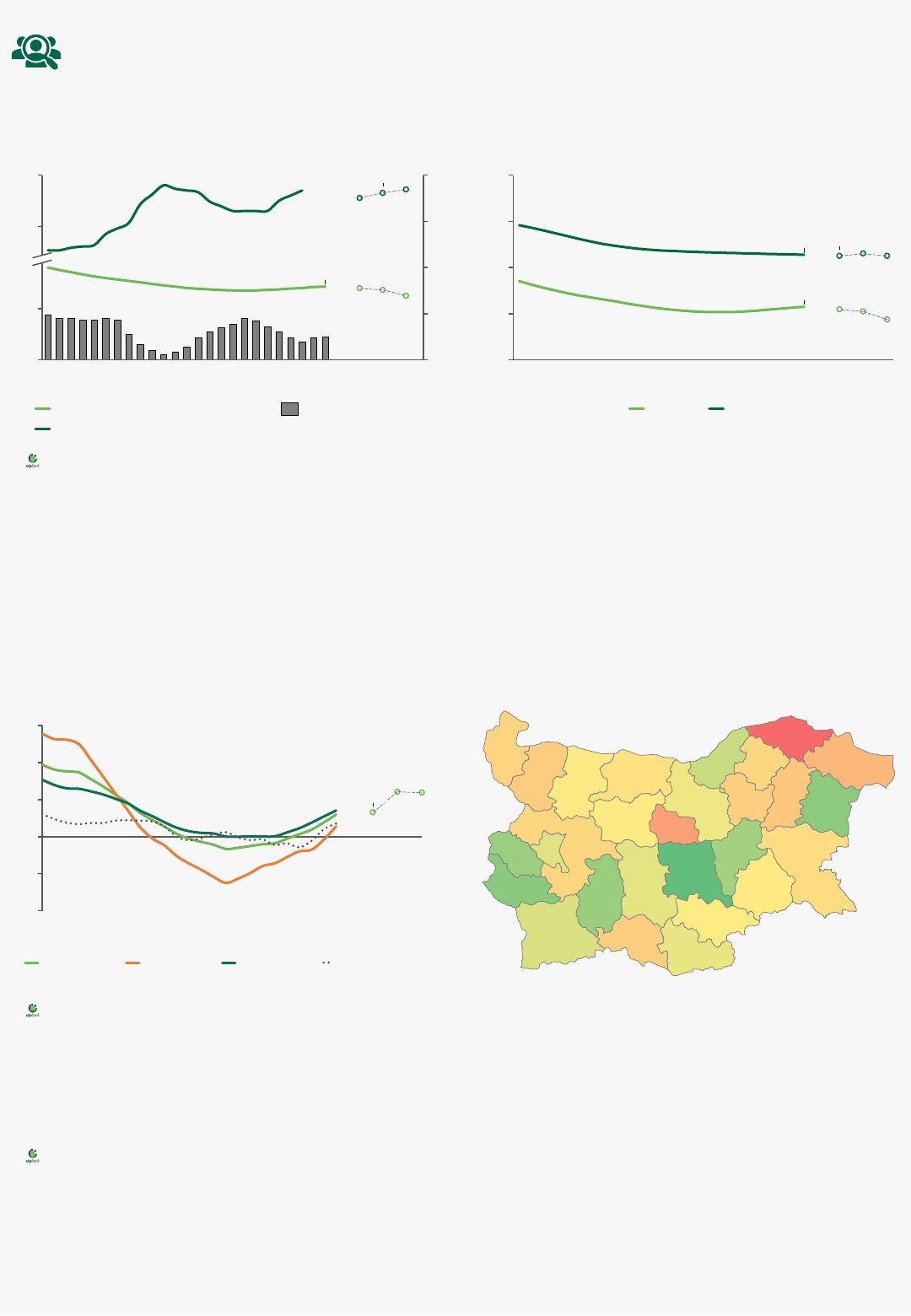
The current macro-environment determines a continued strong performance of the labour
market. Among the most important drivers of rising disposable income are double-digit
nominal wage growth, declining inflation, low unemployment, low lending rates. All this will
have a positive contribution to the economic activity (private consumption is ca. 70% of GDP).
Our 2024 forecast for unemployment is 4.1% or a slight decrease by 0.1 pp. Moreover, the high
employment and staff shortages in several sectors of the economy will additionally support the
wages and as a result, the average nominal wage in 2024 will increase by 10% (in real terms by
6%). We also expect employment (20-64 years of age) to hover ca. 77% over the mid-term period.
Labour market
6
3.3%
6.1%
5.9%
-10%
-5%
0%
5%
10%
15%
09/21
11/21
01/22
03/22
05/22
07/22
09/22
11/22
01/23
03/23
05/23
07/23
09/23
2023
2024
2025
National level Public sector Private sector Financial & insurance sector
Unemployment & Employment* Unemployment
Bulgaria vs. Euro area
The increase in terms of real wages is still gaining momentum
Real wage by sectors
4.3%
4.2%
4.1%
3.7%
100
150
200
250
300
0%
3%
75%
78%
09/22
11/22
01/23
ths.
05/23
07/23
77.1%
09/23
11/21
11/23
76.7%
2023
2024
77.2%
2025
01/22
03/22
05/22
77.0%
07/22
03/23
Unemployment, annual average rate, in %
Employment rate*, in %
Unemployment (persons)
Nominal wage by location
With inflation easing, the labour market seems to be taking over as the main topic that will be
under scrutiny. The trend of the labour market in Bulgaria and the Euro Area is confirmed by
comparing it with the latest macroeconomic bulletin Autumn 2023. The mid-term forecast for
unemployment rate is to remain low, and in the context of a declining inflation and rising
wages, households’ purchasing power will be supported. Economic activity is in its bottoming-
out, however employees have kept their jobs. Business continues facing recruitment challenges.
*Unemployment rate is for the age range of 20 – 64 years of age.
4.3%
6.6%
4.2%
4.1%
3.7%
6.5%
6.6%
6.5%
2%
4%
6%
8%
10%
11/21
01/22
03/22
05/22
07/22
09/22
11/22
01/23
03/23
05/23
07/23
09/23
11/23
2024
2025
2023
Bulgaria Euro area
Annual average growth as of September 2023
Annual average growth
14%
15%
15%
13%
17%
14%
13%
18%
16%
8%
16%
12%
15%
14%
15%
15%
13%
17%
15%
18%
17%
13%
14%
13%
11%
17%
15%
15%
Annual average rate
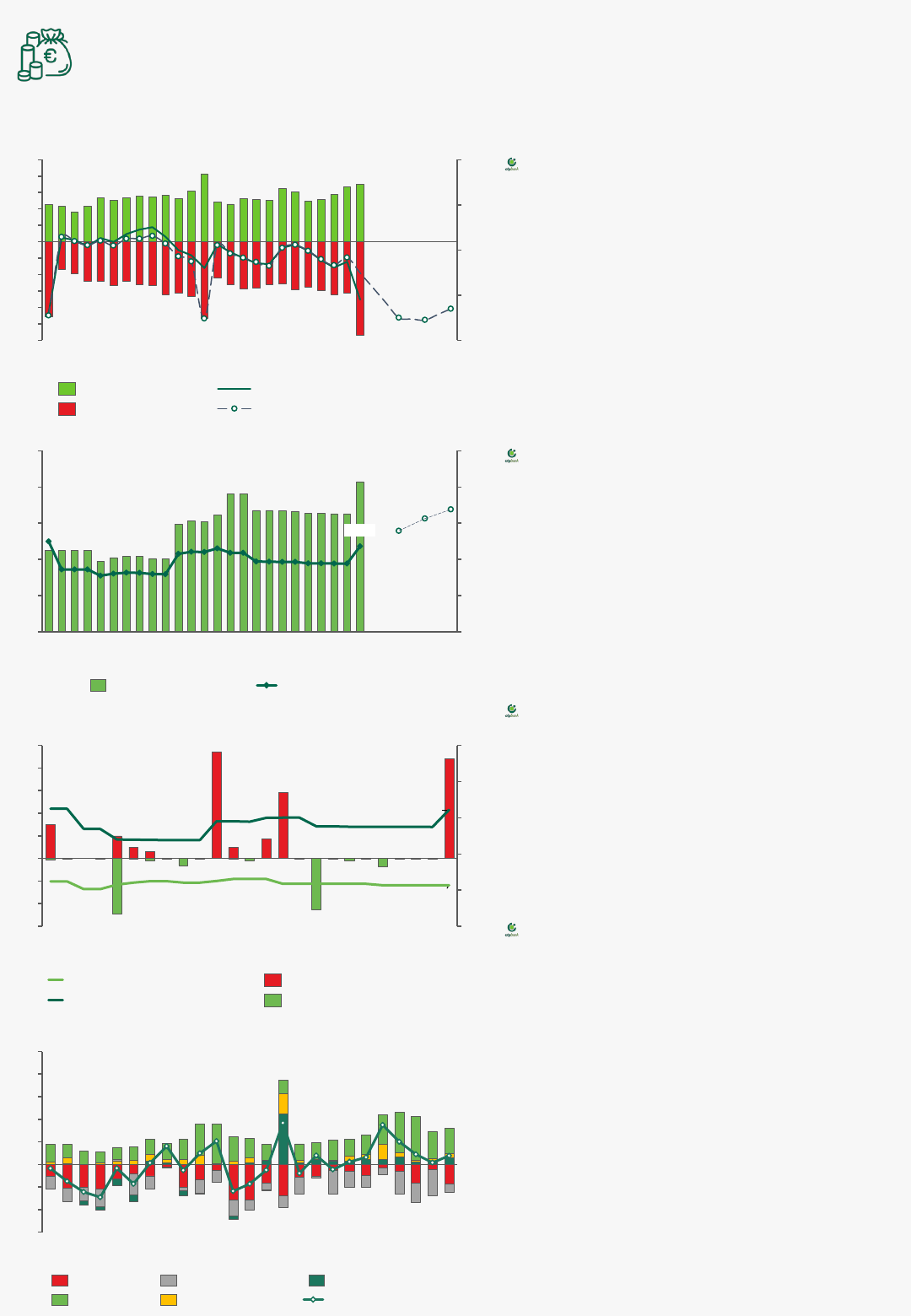
External & Domestic government debt
Already in the past, the local elections in
Bulgaria in the autumn of 2023 did not
lead to serious upheavals in the ruling
coalition. The upcoming European
Parliament election in June 2024 are
generally not characterized by a high
political activity, so we do not expect
them to lead to extraordinary changes.
An important moment in Bulgarian
political life is the publication of the
convergence report of the European
Central Bank and European Commission,
which will assess Bulgaria’s progress to
adopt the euro. Expected publication:
June 2024
The reference date to adopt the euro
remains January 1, 2025. We expect
Bulgaria to fulfill the Maastricht criteria,
except for the inflation criterion. Inflation
in the Euro area is decreasing as well as
in Bulgaria, leaving a significant gap.
According to preliminary data, the state
budget for 2023 performs better than
expected (2.2% vs. 3.0%), which further
confirms Bulgaria’s goal to fulfill all
other Maastricht criteria. Government
debt in the mid-term is expected to
increase smoothly and gradually, fueled
mainly by chronic deficits. In general, for
the sustainable financing of the state
budget, support will be sought from the
international markets.
State budget
7
23.9%
25.6%
26.9%
10%
15%
20%
25%
30%
35%
20
25
30
35
40
45
BGN bn
11/21
01/22
03/22
05/22
07/22
09/22
11/22
01/23
03/23
05/23
07/23
09/23
11/23
2023
2024
2025
21.8%
Nominal amount, in BGN bn Governmen debt/GDP (%)
Consolidated Fiscal Program (monthly)
Government debt
Government finances – good performance and at planned levels in 2023
-3.0%
-3.1%
-2.6%
-4%
-2%
0%
2%
4%
-10
0
10
-12
-8
-6
-4
-2
2
4
6
8
BGN bn
12/21
02/22
04/22
06/22
08/22
10/22
12/22
02/23
04/23
06/23
08/23
10/23
12/23
2023
2024
2025
Revenue & Grants
Expenditure & Transfers
Budget balance, YtD (% of GDP)
Maastricht criteria, YtD (% of GDP)
Current & Capital account (monthly)
-3
-2
-1
0
1
2
3
4
5
BGN bn
10/21
12/21
02/22
04/22
06/22
08/22
10/22
12/22
02/23
04/23
06/23
08/23
10/23
Trade balance
Services, net
Primary income, net
Secondary income, net
Capital account
Current & Capital account
5.7%
16.1%
0%
5%
10%
15%
20%
25%
-3
-2
-1
0
1
2
3
4
5
BGN bn
11/21
01/22
03/22
05/22
07/22
09/22
11/22
01/23
03/23
05/23
07/23
09/23
11/23
Domestic government debt/GDP (%)
External government debt/GDP (%)
Newly issued debt (monthly)
Repayments (monthly)
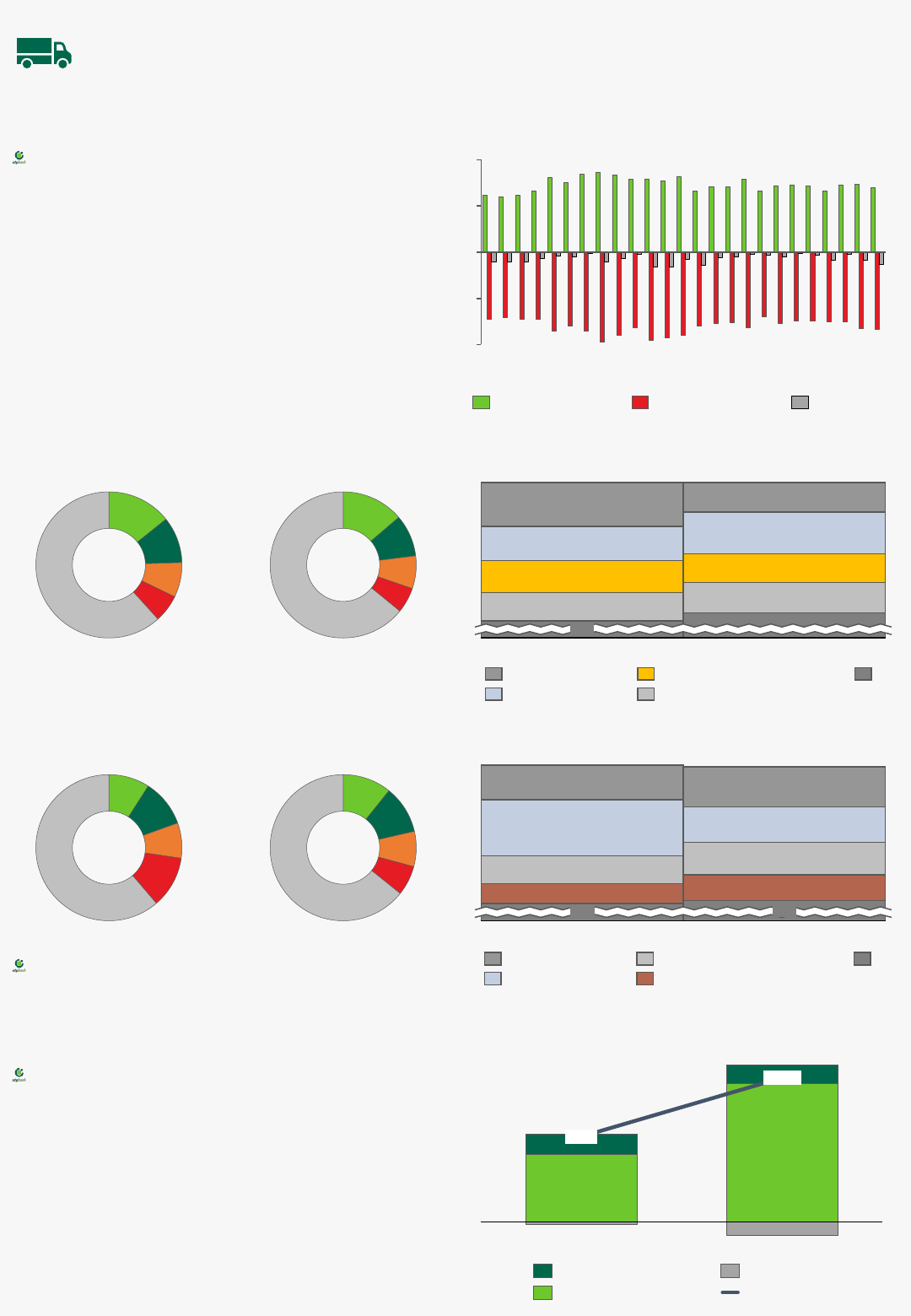
Trade & Investment
8
Export & Import (monthly)
Export, main trade partners
Contracting trade in 2023, with some tentative signs of a bottoming-out
-10
-5
0
5
10
BGN bn
11/21
01/22
03/22
05/22
07/22
09/22
11/22
01/23
03/23
05/23
07/23
09/23
11/23
Export, nominal, BGN bn Import, nominal, BGN bn Trade balance
Direct Foreign Investments (DFI)
Import, main trade partners
14%
10%
8%
6%
62%
Germany
Romania
Italy
Turkey
Other
2022
Jan - Oct
14%
9%
7%
6%
64%
Germany
Romania
Italy
Turkey
Other
2023
Jan - Oct
9%
10%
8%
11%
61%
Germany
China
Turkey
Russia
Other
2022
Jan – Oct
11%
11%
8%
7%
64%
Germany
China
Turkey
Russia
Other
2023
Jan - Oct
3.577
Nov’21 - Nov’22
6.030
Nov’22 - Nov’23
Equity
Reinvestment of earnings
Debt instruments
Total
Export by category
Import by category
12%
9%
9%
7%
63%
Jan - Oct 2022
8%
11%
8%
8%
65%
Jan - Oct 2023
Mineral fuels & Oils
Electrical & Electronics
Copper
Machinery, nuclear reactors, Boilers
Other
10%
17%
9%
6%
58%
Jan - Oct 2022
12%
11%
10%
8%
59%
Jan - Oct 2023
Electrical & Electronics
Mineral fuels & Oils
Machinery, nuclear reactors, Boilers
Vehicles
Other
Bulgaria’s net export of goods and services
for the period January – October 2023 is
expected to decrease compared to a year
ago, which is largely impacted by several
significant events in the energy sector,
cooling inflation and weakened foreign
demand.
Bulgarian trade with Russia has sharply
decreased compared to a year ago
(especially in terms of import).
The main group of exported goods that
report significant annual growth are
medicines, cosmetics, investment goods
(vehicles, machines, spare parts), while raw
materials such as fertilizers, non-ferrous
metals and wood products report the
highest decrease.
BGN bn
2.6% of GDP
3.6% of GDP
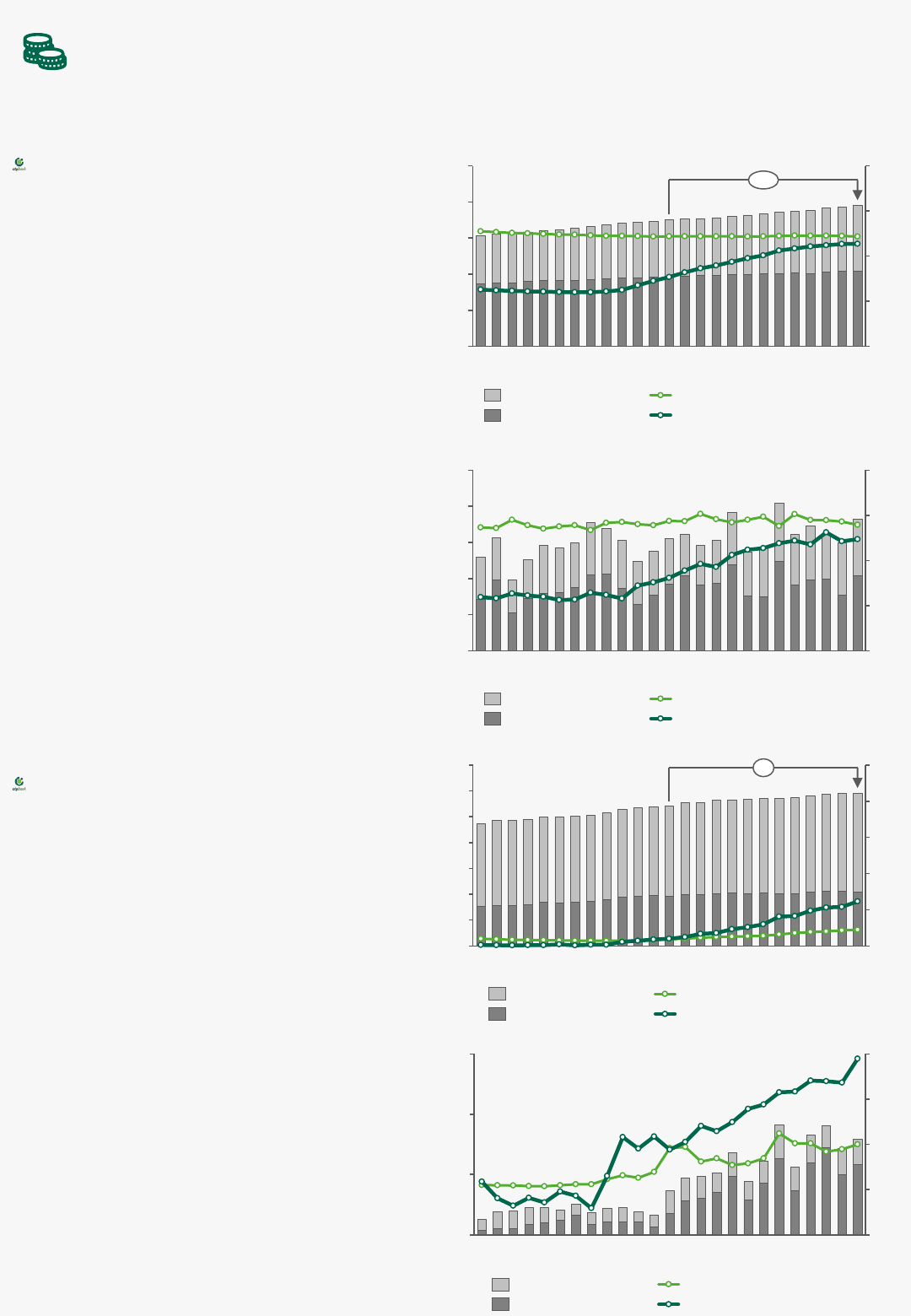
In 2023, the banks in Bulgaria improved
significantly their profitability and
efficiency, with the profit of the sector
increasing by 75% on an annual basis - in
the amount of BGN 3.3 bn as of
November 2023. The improvement is
mainly due to the increased benchmark
interest rates in 2023. In the beginning of
2024, the vibe in central banks is to hold
the current high levels for some time to
consume the desired effect, after which
the reverse process of cutting interest
rates will begin. Until mid-2024, we do
not expect central banks to start an
initiation for expansionary monetary
policy needed for recovery of economic
and lending activity in Europe.
The retail segment in Bulgaria continues
to demonstrate the resistance to the
increase in interest rates on newly
granted loans despite the taken
restrictive measures by the Bulgarian
National Bank in mid-2023. Interest rates
on mortgage loans remains at a record-
low level at the end of November 2023
and 24 consecutive months has not
budged from 2.6%. As a result of that and
together with increasing household
disposable income, the average annual
growth of new production in the
mortgage segment is 16% vs. 8% in the
consumer segment.
Banking system
9
After the strong 2023 in the banking sector, the regulators look for additional brake
Newly credits, volumes & interest rates
Performing loans, volumes & interest rates
0%
2%
4%
6%
8%
0
20
40
60
80
100
BGN bn
11/21
01/22
03/22
05/22
07/22
09/22
11/22
01/23
03/23
05/23
07/23
09/23
11/23
+11%
Households
Non-financial enterprises
Interest rate, Households
Interest rate, Non-financial enterprises
0%
2%
4%
6%
8%
0
1
2
3
4
5
BGN bn
11/21
01/22
03/22
05/22
07/22
09/22
11/22
01/23
03/23
05/23
07/23
09/23
11/23
Households
Non-financial enterprises
Interest rate, Households
Interest rate, Non-financial enterprises
Newly deposits, volumes & interest rates
Deposits, volumes & interest rates
0.0%
0.2%
0.4%
0.6%
0.8%
1.0%
0
20
40
60
80
100
120
140
BGN bn
11/21
01/22
03/22
05/22
07/22
09/22
11/22
01/23
03/23
05/23
07/23
09/23
11/23
9%
Households
Non-financial enterprises
Interest rate, Households
Interest rate, Non-financial enterprises
-1%
0%
1%
2%
3%
0
1
2
3
BGN bn
11/21
01/22
03/22
05/22
07/22
09/22
11/22
01/23
03/23
05/23
07/23
09/23
11/23
Households
Non-financial enterprises
Interest rate, Households
Interest rate, Non-financial enterprises

10
Sources
BULGARIAN NATIONAL BANK
MINISTRY OF FINANCE, BULGARIA
NATIONAL STATISTICAL INSTITUTE
STATISTICAL OFFICE OF THE EU
MINISTRY OF AGRICULTURE, BULGARIA
Disclaimer
❑ This document was issued by the Research team of DSK Bank and whether and in what time
frame an update of this analysis will be published has not been determined in advance.
❑ The macroeconomic bulletin is for information purposes only and the information
contained therein (in whole or in part) may not be disclosed, distributed, reproduced or
published for any purpose without the prior and express consent of DSK Bank.
❑ The Macroeconomic Bulletin is based on publicly available information, the sources of which
are indicated above. Neither DSK Bank nor the staff of DSK Bank assume any responsibility or
liability regarding the accuracy or completeness of this document and are not responsible
for errors in the transmission of factual or analytical data. DSK Bank reserves the right to
change this estimate without notice.
❑ This document should not be construed as an offer to sell or buy any credit/financial
product. The information in this document is general and should not be construed as
personal advice as it has not been prepared for any particular investor. Accordingly,
investors should, before taking any action thereon, seek professional investment advice.
❑ Statements in the macroeconomic bulletin may be considered forward-looking statements
that are based on current expectations and projections of future events. This forecast is not a
guarantee of future results and includes risks and uncertainties. Actual results may differ
materially from those projected as a result of various force majeure circumstances.
Contacts
www.dskbank.bg
Petar.Atanasov@dskbank.bg
0700 10 375
*2375
Actual data Forecasts
NATIONAL STATISTICAL INSTITUTE
(DEMOGRAPHIC FORECAST ONLY)
DSK BANK, RESEARCH TEAM
EUROPEAN CENTRAL BANK
(EURO AREA FORECAST ONLY)
